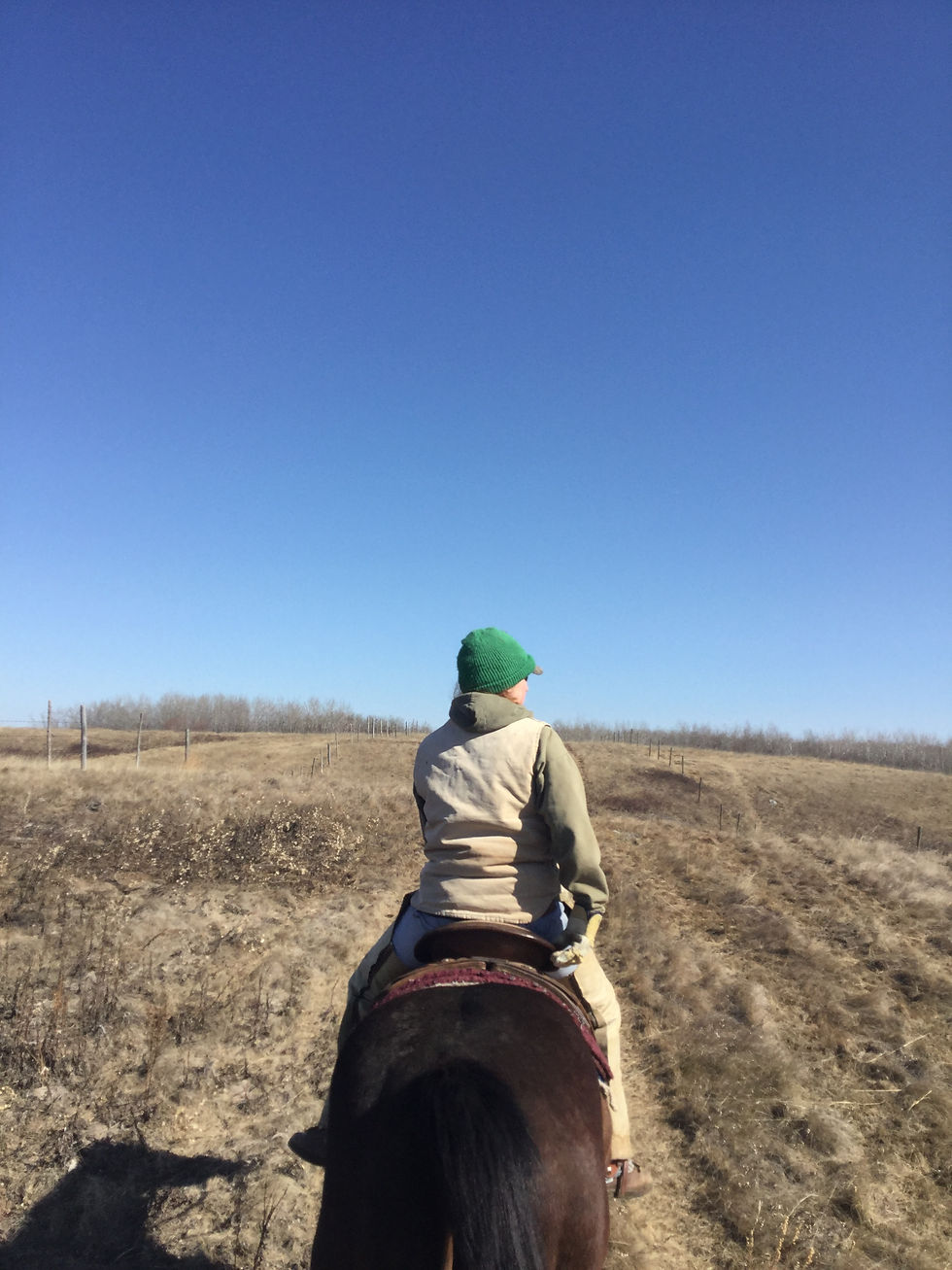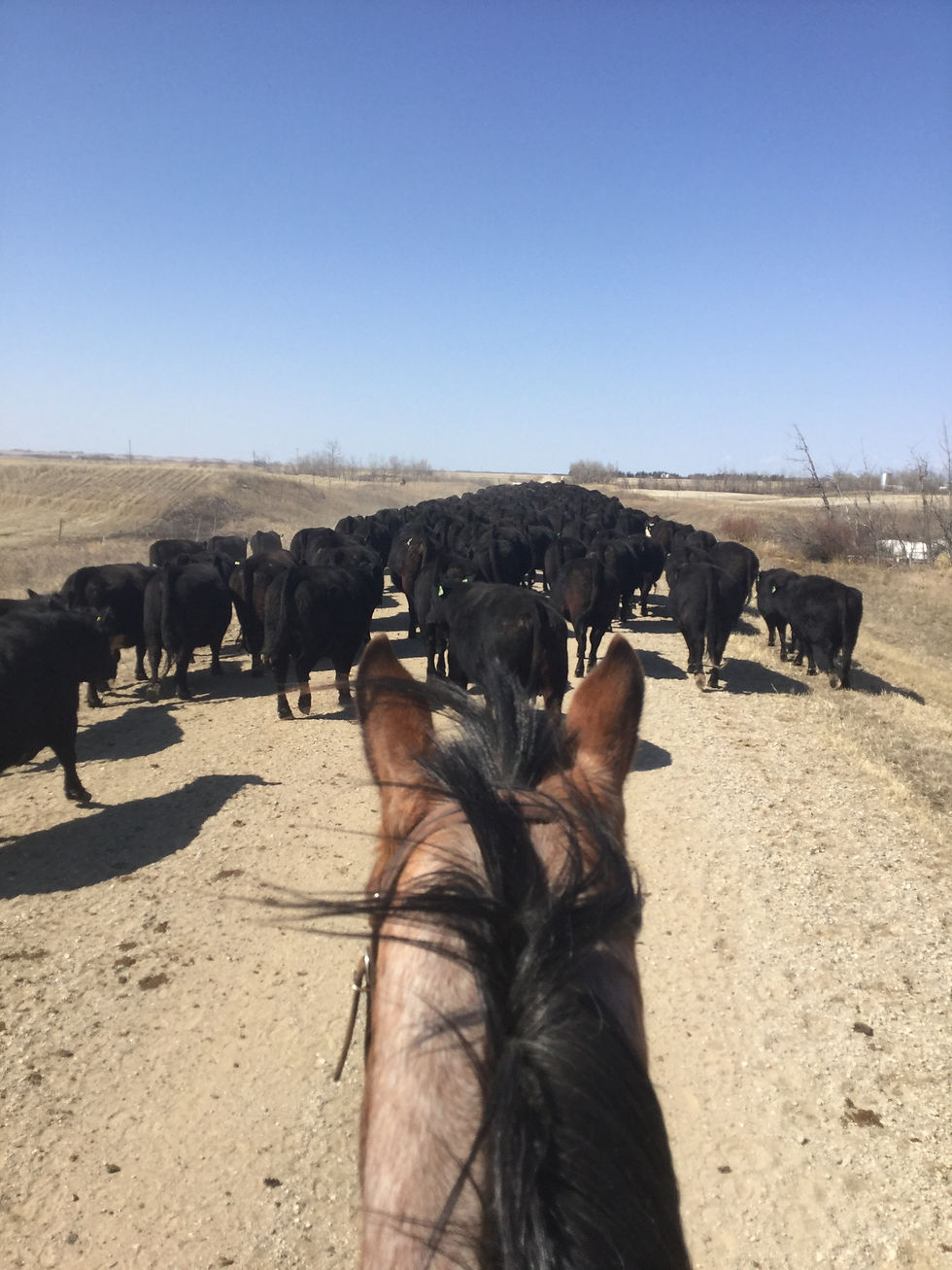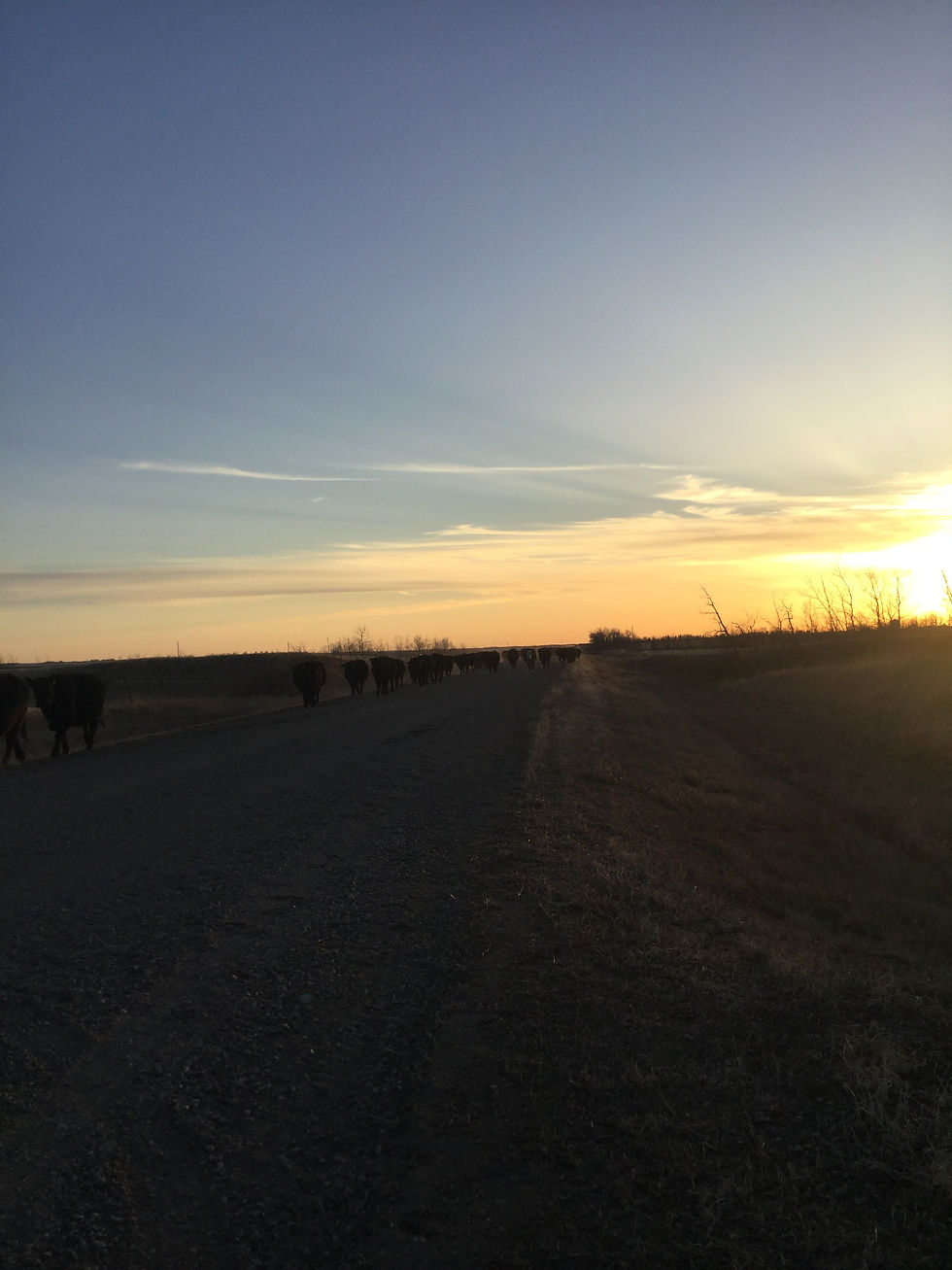First Week Home
- Prairie Chicken

- Apr 30, 2018
- 8 min read






This past week, sister and I completed our college education. On Tuesday, we wrote our last exam, packed up the truck and trailer with all of our worldly possessions, and hightailed it home. It’s the end of an era; an era of food mooching, indoor riding, preset schedules, rowing, and competing for higher GPAs. “Now the real work starts,” people keep saying. “Now it gets harder,” they tell me. People sure do like to rain on parades. Since I’m back home, the manual labour load is definitely going to be more difficult. While at college, our physical workload consisted of short workouts, 2-mile round trips to school, and riding. That’s in the neighbourhood of 2.5 hours of activity. Since we got back on Tuesday, I have spent about 8 hours on horseback and around 14 hours in a dusty corral, sorting cows. Due to the good old prairie winter not seeing fit to leave us until quite recently, Mom and Dad didn’t have an opportunity to get the herd in and sort them off into the pastures they’ll calve in. Or perhaps they saved the workload as a “welcome home!” gift. They had told us it was something we would have to do when we were home, but I always like to assume they are joking and will surprise us with already-sorted cows. Some would call that delusional, but as an optimist, I like to just call it optimism. Optimists are optimistic like that. When we were coming home on Tuesday we all met up in Town to celebrate Grandma’s birthday. Amidst the good cheer of the Chinese food smorgasbord and ice cream cake, I thought it would be a good time for Mom and Dad to surprise us with the news that they’d already sorted the cows. Even after I subtly asked about what the plans were for tomorrow, they were not coming out with the surprise. Spoiler alert: there was no surprise; they hadn’t sorted the cows. A little disappointed that my parents had gotten my hopes up by not lying to me, I resigned myself to the day of work ahead. On Wednesday, we brought the whole herd home and devised a plan to complete a four-way sort. The four groups are each going to different areas of pasture, but rather than just do the easy thing and count out the correct number of cows for each, we sort based on quality of cows. Good cows go one way, average cows go another, and cows that could stand to be sold go another way. Then there are first-calf heifers that aren’t very smart and may need some guidance through their first calving experience. Our system of sorting involved bringing in five cows at a time, recording all of their numbers, then peeling them out accordingly. Mom and I were running the four gates while Dad and Sister took numbers and peeled cows. It’s hard to say who had the hardest job. Was it Sister, shadowing Dad and acting as secretary? Secretary is never the coveted job; it’s where the buck stops. All of your mistakes are written on paper and if your numbers don’t match up to the actual number of cows, it is on the secretary’s account that we have to run everything through again. On the upside, it’s not very labour-intensive. Just flip through the pages, find out where cows go, and write down which cows go through. Then there was Dad’s job. Keeping the cows quiet as he gave Sister the numbers and sorted them off. This job is rendered difficult for Dad as he requires reading glasses these days; which he doesn’t wear for sorting cows. Either that, or he forgets the number from the time he sees it on the cow’s tag to when he turns to tell the secretary. Or maybe both... yes, I think both elements are at play here. Which leads me to unbiasedly explaining why my job was the most difficult. My job was to man the gates with Mom. This meant that Mom and I had to remember which pens were designated for what. Heifers were easy because they’re a lot smaller than the cows, but all the other pens were just filled with black cows. It wouldn’t be so bad to remember these four pens, but sometimes Dad forgot to tell us which way the cows were going as he pushed them towards us. Sometimes he pointed obscurely in the direction they were supposed to go; when we asked, “Do they go here or there?!” He just nodded. Now, you can’t just nod to an option like that. That does not convey a helpful answer, Dad. Sometimes I used my prior knowledge of the cow to infer where she should go. If I didn’t like her, I let her out the gate I thought was fitting. With Dad being a little on the inconsistent side in the tag-reading department, I was also standing in the corner and surreptitiously double checking the numbers as Dad called them out. ‘Surreptitiously’ is a word which here means that, when he called a number wrong, even if it was wildly incorrect, I would only passively suggest, “Are you sure it’s not this number?” That is called respect for your elders, ladies and gentlemen. Of course, while respect for my elders extends to the man with the loud voice, sorting stick in hand, and who is driving cows in my direction, it does not always proceed so readily to my fellow gateman. Who is my mother. Mom tends to get the short end of the stick in cattle matters. Not that we give her the most difficult jobs, but she’s generally on the receiving end of most of the barked orders. I’d like to say it’s just because she’s hard of hearing, but even if that weren’t true, we would still bark. Through the years, it’s just become apparent that Murphy’s Law gravitates around her like I gravitate around cookies. To clarify, that’s quite a bit of gravitational pull. As a result, we mitigate the risk by putting her way out in the outfield and then monitoring that outfield very carefully. So, Mom has the most harrowing job because of her dear family, though it may not be the most difficult. Thanks to all of us contributing to the well-oiled machine, we got the herd sorted and moved out to paddocks just before the sun went completely down. The next day, Thursday, we moved the herds out to their calving pastures. We started with the big herd of average cows, which was the longest drive. Fortunately, it was a highly uneventful move. One old cow took the lead and led the whole herd in the right direction. The only struggle to deal with was the fact that, aside from the lead cow who was determined to go straight there, most of the herd was stopping to splash around in every puddle. There’s no way they got thirsty that often, so I must conclude that they were just taste-testing. Like my cousins when they go to Costco; they aren’t hungry, but they have a pretty good system in place to try all the samples. Or, maybe spring puddles are like a bovine’s annual wine-tasting event. So it was a bit of a push to keep everything caught up with the lead cow, but everything went smoothly. Sister got a bit lost on the way, despite the fact that we have taken the same route to and from that pasture for the last several years. I asked her how she felt about the cows having a better sense of direction. She did not see fit to answer my query. After that group, we moved the good cow herd back to the pasture we had moved the whole herd out of the previous day. Once again some no-nonsense old girls took the lead and trailed right on back. The last group to move out, the cows that could be sold, only had to go down the road a mile and a half, and we were done! Except for all the parts of my body that were grudgingly adjusting to sitting on a horse that long, it was an easy job to move the cows. With everything parcelled out to their calving pastures, we decided to make a Friday a Town Day. Mostly, we were running errands for Sister, who is getting everything ready to start a fancy-pants job in the Big City. She’s kind of a big deal, or so she tells us. On Saturday, it was time to sort yearling heifers. All the steers from the calf crop were sold several weeks ago, leaving around 140 heifers. If these, our goal was to sort off 65 of the best and sell the rest. Every year, the heifer sort is quite the ordeal. Dad makes a list of all the heifers, ordered by when they were born and listing features of the dam: temperament, udder, feet, and conformation. Then we make a list of all their numbers listed in numerical order and where to find them in the other sheet. With this system, we could pull groups of four heifers out of the pen, record the numbers, then cross-reference the list in order to find the heifer’s information relatively quickly. It’s quite the system - one that annually inspires me to find some electronic method of keeping herd records. Using this method we sort ‘keeps’ from ‘culls’. Anything very unattractive gets culled right away, while the potential keeps get screened so we don’t keep genetics for poor udders and feet. That’s the theory, anyway. If they come from an old cow, especially if it’s an old cow that has raised nice calves in the past, we are liable to keep the heifer no matter how she looks. If it is a really nice heifer, we will also make excuses for a poor dam. Sometimes, if it is an ugly cow that raises poor calves, we will keep the heifer just because the cow lived to an old age. It is a highly flawed system. But we aren’t done after that first sort. Oh, no. After each draft of 70 heifers, we would slowly let the cull heifers out, taking care to comb through and put any keepable ones back in the keep pen. “We’ll put her in the keep pen and kick her out again if she doesn’t fit.” This is the age-old lie we tell ourselves when sorting heifers. Once they go into the keep pen, they don’t come out too often. The bulk of this whole, painstaking process is run by Dad and myself. I take on the secretary role, since I know the cows better than Sister. Unfortunately, I have never been the queen of multitasking, struggling as I do to even just task. I got the first draft of heifers alright, but in the second one, my counts were all amiss, and we had to run all the keeps through again to get their numbers. As I floundered and failed at writing numbers down while making snap judgements on heifers, Sister ran the gates. Her job wasn’t too bad because we brought the heifers slow (such is the nature of our decision-making). Also, there are considerably quieter herd genetics now than we used to have. There was a time when we’d still keep the rammy ones; now if they rush the gate, we just let them go. This makes sorting in the confined space a whole lot less of a rush. Mom just stays inside for this whole process. We don’t need a lot of manpower to scratch our chins over 65... 70... 75 replacement heifers for 8 hours. In the end, we kept 75 heifers, because Dad just can’t stand to see them in the cull pen. We have also walked through the cull pen recently and he’s picked out five more heifers he wants to keep. He’s incorrigible. Well, this has been my extremely dusty first week back. I have inhaled a lot of earth these last few days, and when I showered, I truly did smell like a wet horse. What a time to be alive. I guess it’s true that the work gets harder out of college; but it doesn’t follow that I can’t enjoy it more.

















Comments